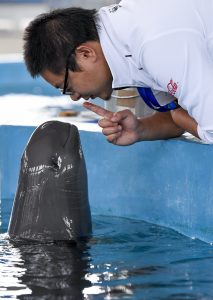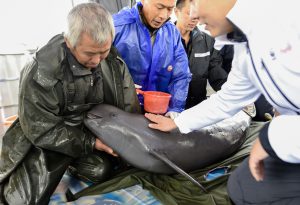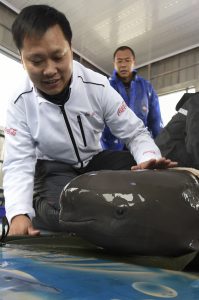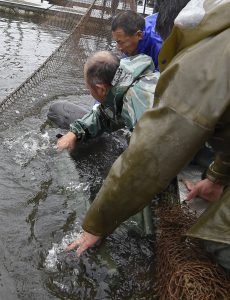By Xuefei Chen Axelsson
STOCKHOLM, Nov. 21(Greenpost)–Ms Karin Wanngård, Mayor of Stockholm, has announced that Wayne Roberts, director of Katie Says Goodbye, as winner of Stockholm Impact Award.
During the Stockholm International Film Festival Award Ceremony, Roberts received the prize designed by Ai Weiwei and was given 1 million SEK in support to upcoming film projects.
The jury including the directors Sofia Exarchou (Park), Alankrita Shrivastava (Lipstick Under My Burkha) and Mohammed Hammad (Withered Green) – all of them with films of their own in the festival program – has announced Wayne Roberts as winner of the film award Stockholm Impact Award.
Motivation: Katie Says Goodbye is a sensitive, layered and complex, coming of age story of a young American girl. The film displays a clearly female sensitive gaze, without sensationalizing Katie’s heart breaking story. It shows us the complexity of human nature and people and relationships, be they women or men, without judgment. The cinematic style of the film is fresh and subtle, and the performance of Olivia Cooke as Katie is compelling. It leaves you experiencing the innocence, the darkness, the vulnerability and the strength of the lovable Katie. It is a startlingly brave portrayal of a young woman. Through its sensitive handling of the politics of what it means for a woman to have agency over her own body, it challenges age old stereotypes of women.
– I am very glad that Stockholm and Stockholm Film Festival for the second year hands out Stockholm Impact Award. The purpose of the prize is to highlight film that reflects our society and film that does not shy away from sensitive topics. Film has the ability to reflect our modern society, and films like this one are contributions in the shaping and development of our society, says Karin Wanngård (s), Mayor of Stockholm.
Wayne Roberts received the film award designed by Ai Weiwei during the Stockholm Film Festival Award Ceremony on Friday 18th of November.
The section Stockholm Impact Award is a collaboration between the Stockholm International Film Festival and the City of Stockholm with the purpose to highlight the possibility of film to create change and debate through the depiction of contemporary subjects. The prize amount of 1 million SEK will help the winner in the development of new film projects.
Nominated for Stockholm Impact Award:
500M800M by Yao Tian (Hong Kong, China),
The Citizen by Roland Vranik (Hungary),
The Dark Wind by Hussein Hassan (Iraq, Germany, Qatar),
The Fixer by Adrian Sitaru (Romania, France),
Katie Says Goodbye by Wayne Roberts (USA, France),
Play the Devil by Maria Govan (Trinidad& Tobago, Bahamas, USA).
– I am very glad that Stockholm and Stockholm Film Festival for the second year hands out Stockholm Impact Award. The prize strengthens Stockholm as an attractive film city. My clear ambition is that more filmmakers use Stockholm as their film location. That creates jobs, provides income to the city and business and markets Stockholm’s place in the world, said Karin Wanngård (s), Mayor of Stockholm earlier.
Stockholm International Film Festival and The City of Stockholm instituted the prize Stockholm Impact Award last year and 2015’s winner was the Indian director Leena Yadav for her film Parched.
Stockholm International Film Festival also arranged an Impact Seminar where the Politics of Storytelling was debated. People have discuss how, by highlighting issues such as class, religion, civil rights, freedom of speech, immigration and war crime, a film impacts the society it portrays.



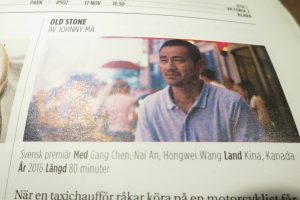 王楠福(音译)的《Hooligan Sparrow》获最佳纪录片奖。
王楠福(音译)的《Hooligan Sparrow》获最佳纪录片奖。 王楠福的《Hooligan Sparrow》讲述的是海南省有六个学生被老师绑架,施暴,当局企图平静该事件。王楠福冒着个人的危险揭露当地政府的腐败,激发人们的讨论和思考。影片批判妇联没有发挥好维护妇女权利的作用。
王楠福的《Hooligan Sparrow》讲述的是海南省有六个学生被老师绑架,施暴,当局企图平静该事件。王楠福冒着个人的危险揭露当地政府的腐败,激发人们的讨论和思考。影片批判妇联没有发挥好维护妇女权利的作用。










 该影片反映了靠海边的曼彻斯特小镇的蓝领工人帕特里克的艰难生活和不幸。
该影片反映了靠海边的曼彻斯特小镇的蓝领工人帕特里克的艰难生活和不幸。
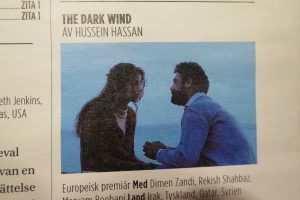 正当二人想结婚的时候,突然遭到ISIS蒙面武装分子的袭击。躲到寺庙里的10多个姑娘都被武装分子抓了出来。她们被糟蹋后又被卖给了别人。
正当二人想结婚的时候,突然遭到ISIS蒙面武装分子的袭击。躲到寺庙里的10多个姑娘都被武装分子抓了出来。她们被糟蹋后又被卖给了别人。
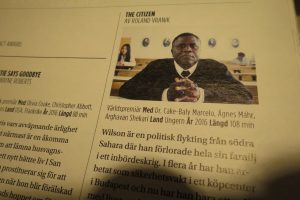 但是,他在外面遇到一个叫玛丽的白人女子,两个人情到深处就睡到了一起。但是,旁边的房间就是另一个年轻女子。玛丽希望能和这个黑人结婚。当然对方也希望结婚因为这样可以留下来,拿到公民身份。
但是,他在外面遇到一个叫玛丽的白人女子,两个人情到深处就睡到了一起。但是,旁边的房间就是另一个年轻女子。玛丽希望能和这个黑人结婚。当然对方也希望结婚因为这样可以留下来,拿到公民身份。

